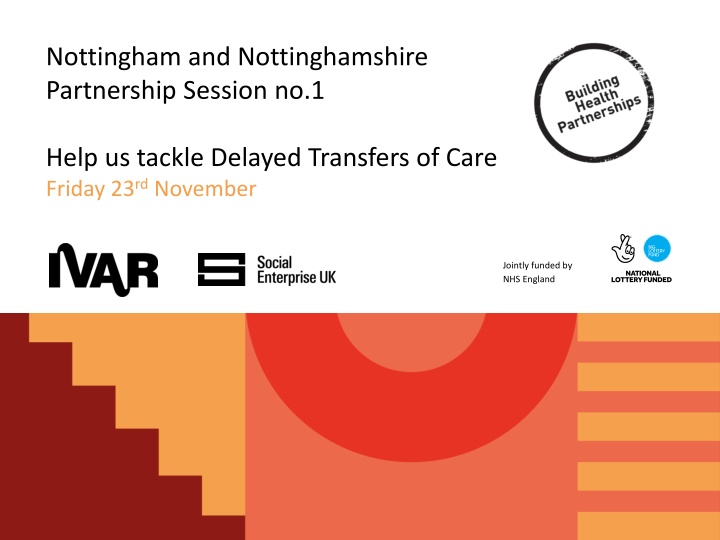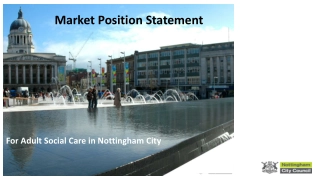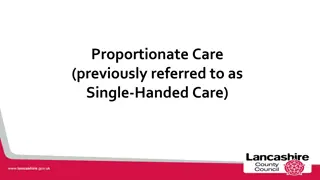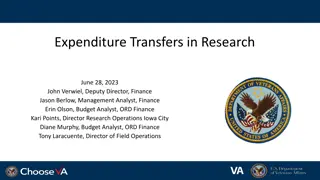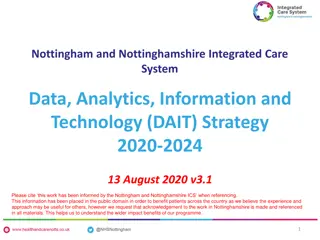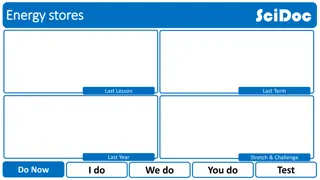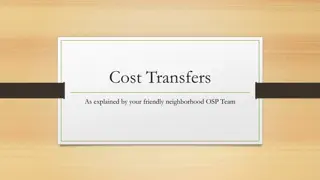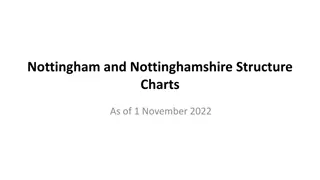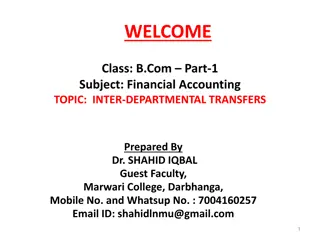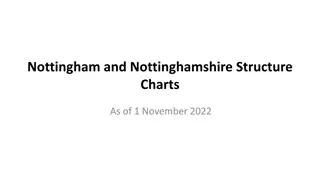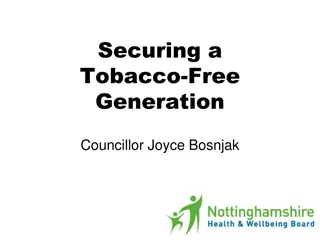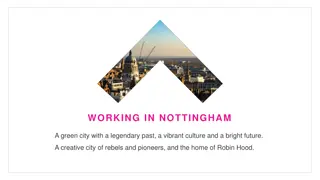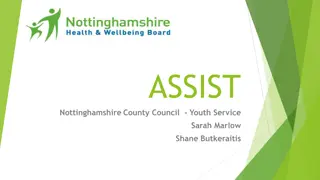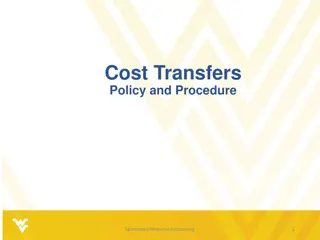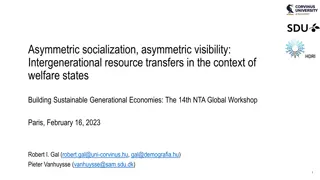Addressing Delayed Transfers of Care in Nottingham & Nottinghamshire Partnership
The Nottingham & Nottinghamshire Partnership, jointly funded by NHS England, is focused on tackling Delayed Transfers of Care (DToC). Through the Building Health Partnerships program, efforts are being made to understand and improve the discharge process for patients. Local leaders emphasize the importance of cost-effective solutions, timely discharge, and creating partnerships that prioritize patient recovery and mobility. Partnership dynamics in Nottingham & Nottinghamshire involve inclusivity, clear focus, and the involvement of diverse voices to work towards common goals.
Download Presentation

Please find below an Image/Link to download the presentation.
The content on the website is provided AS IS for your information and personal use only. It may not be sold, licensed, or shared on other websites without obtaining consent from the author.If you encounter any issues during the download, it is possible that the publisher has removed the file from their server.
You are allowed to download the files provided on this website for personal or commercial use, subject to the condition that they are used lawfully. All files are the property of their respective owners.
The content on the website is provided AS IS for your information and personal use only. It may not be sold, licensed, or shared on other websites without obtaining consent from the author.
E N D
Presentation Transcript
Nottingham and Nottinghamshire Partnership Session no.1 Help us tackle Delayed Transfers of Care Friday 23rd November Jointly funded by NHS England
UNDERSTANDING BUILDING HEALTH PARTNERSHIPS (BHP) The national Building Health Partnerships (BHP) programme is working with the Nottingham and Nottinghamshire Health and Care System and the Voluntary and Community Sectors to establish a clearer picture of what is happening now, and what could be implemented in the future to improve the process of patients being discharged from hospital. The Building Health Partnerships programme aims to: create a better understanding of the circumstances resulting in delays; improve our understanding of all the services and types of care that are available through the voluntary and community sectors, how to access them, and identify where the gaps are (so what is not available but could be); look at how we could jointly develop and implement what is required (e.g. appropriate packages to support patients going home); build capacity to respond to demand. IVAR.ORG.UK SOCIALENTERPRISE.ORG.UK 2 BUILDING HEALTH PARTNERSHIPS 2018-19
LOCAL CONTEXT David Pearson: Nottingham ICS Lead A focus on Delay Transfer of Care (DToC) to be more cost-effective, better for the population and working together to ensure a solution (with technology) Every extra day an older person is in a hospital bed results to a year less of physical mobility Kay Parker: Integrated discharge Lead Work with services to help patients get the best environment to recover, hence the focus is on home-first along with safe and timely discharge. Helping people find the correct pathway (described three pathways) Ian Haines: Strategic Development Manager DToC can be improved by enabling patients to go onto the right pathway. Making hospitals aware about the services available for the patients, post discharge, will enable discharges to happen faster Alex Ball: Director of communication, Nottingham ICS DToC has an impact on the cost as well as the recovery time and hence, we need to solve this concern with tangible solutions through conversations and making stronger connections Aim to look outwards for answers and then inwards IVAR.ORG.UK SOCIALENTERPRISE.ORG.UK 3 BUILDING HEALTH PARTNERSHIPS 2018-19
WHAT DOES PARTNERSHIP LOOK LIKE IN NOTTINGHAM AND NOTTINGHAMSHIRE? Need to be mindful of language used during partnership working, do not use jargon, language must be accessible Do not try to be something you are not Voluntary sector organisations are smaller, have fewer resources and capacity, and can have less clout Need a clear focus and vision to work towards Partnership work can be bumpy and an uphill struggle There are missing voices, who is not here that should be heard, are all relevant partners being represented i.e. carers and patients Individuals have multiple roles Partnership building is about recognising the differences and working past it for a common goal BHP must be a place where the community is able to speak out about what they need and a place to listen as well Partnerships must include small and medium sized VCSEs IVAR.ORG.UK SOCIALENTERPRISE.ORG.UK 4 BUILDING HEALTH PARTNERSHIPS 2018-19
THE CORE GROUP Alex Ball - Director of Communications and Engagement, Nottingham and Nottinghamshire Integrated Care System Jules Sebelin & Becky Cameron Head of Business Development/Deputy CEO & Head of Engagement, Nottingham Community & Voluntary Service Ian Haines - Strategic Development Manager, Adult Social Care and Public Health Transformation Team Louise Dabell - Project Manager, Home First / Discharge to Assess Workstream - Greater Nottingham Lewis Etoria Head of Communications & Engagement, Nottingham and Nottinghamshire Integrated Care system Jane Laughton Interim CEO, Healthwatch Nottingham & Nottinghamshire Tinu Akinyosoye - Rodney Programme Manager, NHS Midlands and East Strategic Projects team IVAR.ORG.UK SOCIALENTERPRISE.ORG.UK 5 BUILDING HEALTH PARTNERSHIPS 2018-19
CASE STUDIES Key themes highlighted from three case studies looking at the problem of DToC from the community- side: What could we do to improve the patient/ family experience now? What could we do if changes were made? Risk aversion Develop community connectors Understanding whose responsibility it is Capacity building in the voluntary sector Person-centred approach to community and listening to the patient Embed a pathway of services Understand what s in the community and developing an asset-based approach Technology IVAR.ORG.UK SOCIALENTERPRISE.ORG.UK 6 BUILDING HEALTH PARTNERSHIPS 2018-19
Action plans IVAR.ORG.UK SOCIALENTERPRISE.ORG.UK 7 BUILDING HEALTH PARTNERSHIPS 2018-19
Idea under development What do we need to make it happen? Long term funding for a consistent navigator and facilitator/ housing offer for discharge support Joined up thinking and funding to enable sustainable support offer Looking at quality of life, impact as well as savings made impact Skills and capacity Very next steps Several examples of well-regarded projects with short term funding challenges Draw up current picture of discharge support services, what they cover and how long they are funded, for e.g. benefits, groups IVAR.ORG.UK SOCIALENTERPRISE.ORG.UK 8 BUILDING HEALTH PARTNERSHIPS 2018-19
Idea under development What do we need to make it happen? Invite other representatives to encourage better understanding e.g. private care providers Systems that speak to each other The individual do their own case management: knowledge of health and wellbeing Look into recruitment challenges: possible forums; staff groups; localities Addressing the gap in resources and home assessment need to be more focused What are the barriers/ solutions? Very next steps Skills and capacity Look at the root cause Knowledge around DToC Communication around DToC Junior Doctors supported to allow discharge- if a medical professional is able to take responsibility in the community, patients should also be allowed joint discharge Communication with wider sector IVAR.ORG.UK SOCIALENTERPRISE.ORG.UK 9 BUILDING HEALTH PARTNERSHIPS 2018-19
What do we need to make it happen? Idea under development Continued/ increased funding for community voluntary sector communications and engagement Embed community connectivity within hospital settings and primary care Improve shared working practices Culture change Challenging risk adverse practice Skills and capacity Very next steps Invite other representatives to encourage better understanding e.g. private care providers Online service directories CVS s Look into recruitment challenges: possible forums; staff groups; localities Community together surgeries What are the barriers/ solutions? IVAR.ORG.UK SOCIALENTERPRISE.ORG.UK 10 BUILDING HEALTH PARTNERSHIPS 2018-19
What do we need to make it happen? Idea under development Equipment e.g. Hoist; Pressure care; Hospital bed; A.T. Move from two careers to one - Link it to occupational therapy (greater use of OTs in training people around double up By creating alternative solutions including, patient choice, assistance technology, risk assessment. - Greater awareness - One go to location for A.T Community connectivity: do we need voluntary sector to provide input into the homes Risk taking, patient choice is going home for bed based care better. Skills and capacity Very next steps Utilise carers/ patient voice about how to do better care at home Trial and evaluate What is the role of the voluntary sector supporting this? Understand what AT can offer? IVAR.ORG.UK SOCIALENTERPRISE.ORG.UK 11 BUILDING HEALTH PARTNERSHIPS 2018-19
What do we need to make it happen? Idea under development Raise at next core group Small group to plan and make happen- ICS to lead Voluntary sector mapping and link workers Share details next core group Small group to plan and make happen- ICS to lead Voluntary sector mapping and link workers Share details Community connectivity, social prescribing scheme- public understanding and co-production Support video idea demonstrating system approach to person and community centred approaches / experience of discharge/ different conversation MECC: make every conversation count Very next steps Skills and capacity Integrate discharge team/ home first project (for data to inform) Next core group meeting Link in with community centred approaches co- production forum (Greater Notts) Capacity in community- both funded and engage citizens developed by local people Person and community: ICS community centred approaches programme Identify/ invite citizen representation to core group. Patient groups etc. focus dependent Health watch discharge materials Link into ICS communications group Theatre and videos are a powerful method Outside confetti- Nottingham college IVAR.ORG.UK SOCIALENTERPRISE.ORG.UK 12 BUILDING HEALTH PARTNERSHIPS 2018-19
LINKING TO EXISTING RESOURCES Understand existing reviews on DToC pathways across the whole system Understanding organisational memory Link to the clinical strategy IVAR.ORG.UK SOCIALENTERPRISE.ORG.UK 13 BUILDING HEALTH PARTNERSHIPS 2018-19
To read more about Building Health Partnerships, please visit ivar.org.uk/our-research/building-health- partnerships Institute for Voluntary Action Research 020 7921 2940 @IVAR_UK ivar.org.uk Social Enterprise UK 0203 589 4950 @SocialEnt_UK socialenterprise.org.uk IVAR.ORG.UK SOCIALENTERPRISE.ORG.UK 14 BUILDING HEALTH PARTNERSHIPS 2018-19
